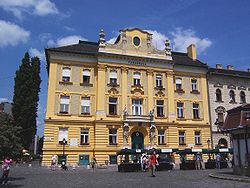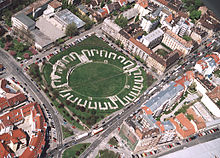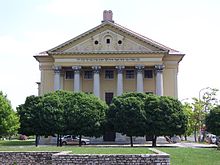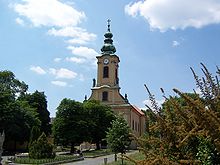- Óbuda
-
Óbuda (sometimes written in English as Obuda) was a historical city in Hungary. United with Buda and Pest in 1873 it now forms part of District III-Óbuda-Békásmegyer of Budapest. The name means Old Buda in Hungarian (in German, Alt-Ofen). The name in Croatian and Serbian for this city is Stari Budim, but the local Croat minority calls it Obuda (the name "Budim" they use for the fortress in Buda).
The island (Óbuda Island) next to this part of the city today hosts the Sziget Festival, a huge music and cultural festival.
Óbuda's centre is Fő tér (Main Square), connected to a small square with a sculpture of people waiting for the rain to stop. It is accessible by HÉV (Árpád híd station).
History
Settlements dating from the stone age have been found in Óbuda. The Romans built Aquincum, the capital of Pannonia province here. Hungarians arrived after 900 and it served as an important settlement of major tribal leaders, later kings. Béla IV of Hungary built a new capital after the 1241-1242 Mongol invasion in Buda, somewhat south of Óbuda. In 1850, 31.4% of the population of 11 thousand were Jewish. On 1 January 1873 it was united with Buda and Pest to form Budapest.
People
- Károly Bebo (1712 - 1779) - sculptor
- József Manes Österreicher (1759-1831) - physician
External links
- Óbuda website (Hungarian)
- A Walk through Old Buda (English)
Categories:- Óbuda
- Hungary geography stubs
- Hungarian history stubs
Wikimedia Foundation. 2010.




